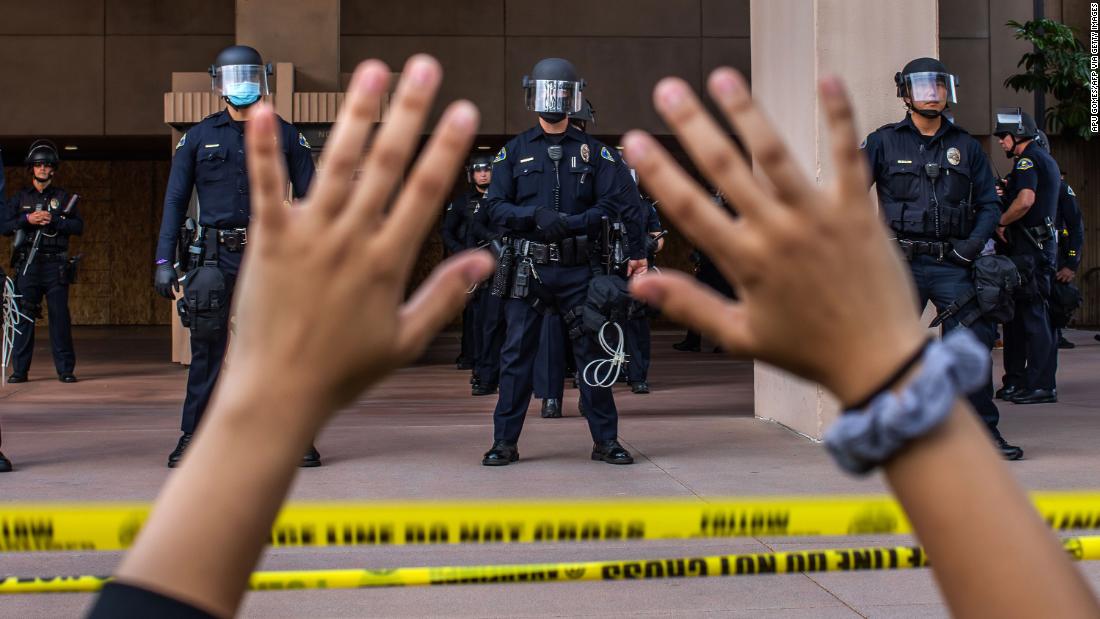Demonstrators sparked an unprecedented movement but politics may have got in its way
What began as local outrage in response to George Floyd’s death following an encounter with Minneapolis police officers soon spread throughout the country.
Despite the personal risk, their voices were heard by fellow citizens and politicians alike, as demonstrators sparked a protest movement unlike anything the country has seen since the 1960s.
But it all may have been for nothing.
Partisan politics appears to have derailed any meaningful near-term reform.
Failure at the epicenter
Walz said reform measures would be aimed at police violence, grants for rebuilding local infrastructure, accountability and transparency.
But legislators had little to show for their efforts. Partisan entrenchment ruled the day, as the Republican-controlled Senate and Democratic-led House clashed over nearly two-dozen policing reform measures.
Despite widespread calls for reform, the special legislative session came up empty handed.
In Minneapolis, where the city council continues to address policing reform, grand visions for change appear devoid of specifics and are far from being enacted anytime soon.
A federal failure
Minnesota lawmakers were not alone in their failure to overcome partisan politics and pass immediate, meaningful legislation.
In the House, Democrats passed their own version of sweeping police reform on Thursday. The measure calls for limiting qualified immunity for police officers, prohibiting racial profiling and banning choke holds.
Despite the bill’s passage on a largely party-line vote, the Senate is not expected to consider it, and President Donald Trump isn’t likely to throw his support behind Democratic legislation championed by House Speaker Nancy Pelosi.
‘Encouragement’ over ‘enforcement’
Advocates who want to eliminate the technique outright seized on this loophole, which would allow an officer to use a choke hold if they fear their life is in danger.
The issue of banning choke holds will remain controversial. Some policing experts contend that, in a deadly situation where an officer is fighting for his or her life, anything goes.
While Trump’s order purportedly takes aim at officers who “misuse” their authority, the President himself has called for the use of excessive force against those in custody.
Upon taking office, Trump praised the aggressive tactics of immigration officers and suggested that police shouldn’t protect the heads of handcuffed suspects being put in the back of a car.
‘If we don’t get it now, we’ll never get it’
Despite calls by criminal justice reform activists for immediate changes to policing in America, there are some groups who appear content with buying time.
Last Monday, Bob Kroll, president of the Minneapolis police union, told me he had not read all of the bills working their way through the state legislature. But he cautioned against rushing through police reforms.
In comments that appeared tone-deaf to Floyd’s pleas to the officer choking him, Kroll said of efforts to rush through policing reform: “Everybody’s got to take a breath.”
While the Minneapolis police union calls for more time, criminal justice advocates say lives remain in danger every day that passes without new constraints on officers.
Perry said she and other families have been trying desperately to get the attention of elected leaders and have them take concrete steps to root out bad cops. Perry said she will continue their efforts until they are successful.
Asked how long she will continue to be a public face for policing reform, Perry said, “Until we get justice.” Seizing on this moment of unprecedented national protest against police violence, she added: “If we don’t get it now, we’ll never get it.”
CNN’s Aaron Cooper, Steve Almasy, Ray Sanchez, Clare Foran, Manu Raju, Lauren Fox, Ted Barrett, and Kevin Liptak contributed to this report.
![]()


